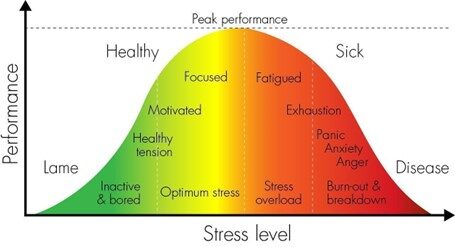Stress, Anxiety and Parental Expectations

“If children feel safe, they can take risks, ask questions, make mistakes, learn to trust, share their feelings, and grow.”
Alfie Kohn, author and lecturer in the areas of education, parenting, and human behaviour.
In my role as a School Psychologist, I often work with students to support them with strategies to manage their stress and anxiety.
Both stress and anxiety are normal reactions to stressors in our environment and can help to protect or motivate students in a positive way. For example, when preparing for an exam a healthy level of stress can motivate a student to start studying.
However, stress and anxiety can become unhealthy when they start to impact a student’s wellbeing and in turn their performance (see Figure 1).
Students’ stress and anxiety are often related to their schoolwork and the unrealistic expectations and pressure they place on themselves and/or perceive from others. This could be pressure to achieve high marks or to follow in the footsteps of a family member. The stress may extend to exams and tests and impact their performance and concentration on the day.
As parents and caregivers, we often want what is best for our child and hold certain expectations about them, even before they are born. Having these expectations can show our child that we think they are capable and can encourage them to develop their abilities and build confidence. It can communicate to our child that what they do is important and that they matter.
It is critical to recognise whether our expectations emerge from our unique understanding of our child’s interests, talents, and temperament, or reflect our own hopes and goals, regardless of the uniqueness of our child.
Parental expectations can become harmful when our child cannot meet the expectations and parents express their disappointment. Our child can internalise this disappointment as not being good enough, which also impacts their self-esteem and brings about a sense of shame.
Our child may be trying their best to meet our expectations, however, may not have the talent to meet possibly unrealistic expectations for them, for example high marks in a subject they are struggling to understand. The perceived pressure to achieve unrealistic goals defined by others can lead to depression and anxiety.
It is important to get the balance right in our expectations of our child.
Ask yourself the following questions:
- Do my expectations align with my child’s interests, talents, and temperament?
- Are my expectations of their marks realistic based on their ability?
- Is my child showing signs of stress or anxiety that is impacting their learning and wellbeing?
- Should I adjust my expectations to make them more achievable for my child so they can feel a sense of success and build their self-esteem?
- Is my child already trying their best and am I adding to their stress by expressing my high expectations?
- Am I expecting my child to achieve the same things as a sibling, parent, or peer?
- How do I respond when my child shares their marks with me, in particular a lower mark than anticipated?
- How does my child respond when they don’t achieve my expectations?
The wellbeing of our child impacts their learning and development. If we focus on their wellbeing they will flourish and succeed.
At St Catherine’s our aim is to work in partnership with parents to educate and support the students in our care.



